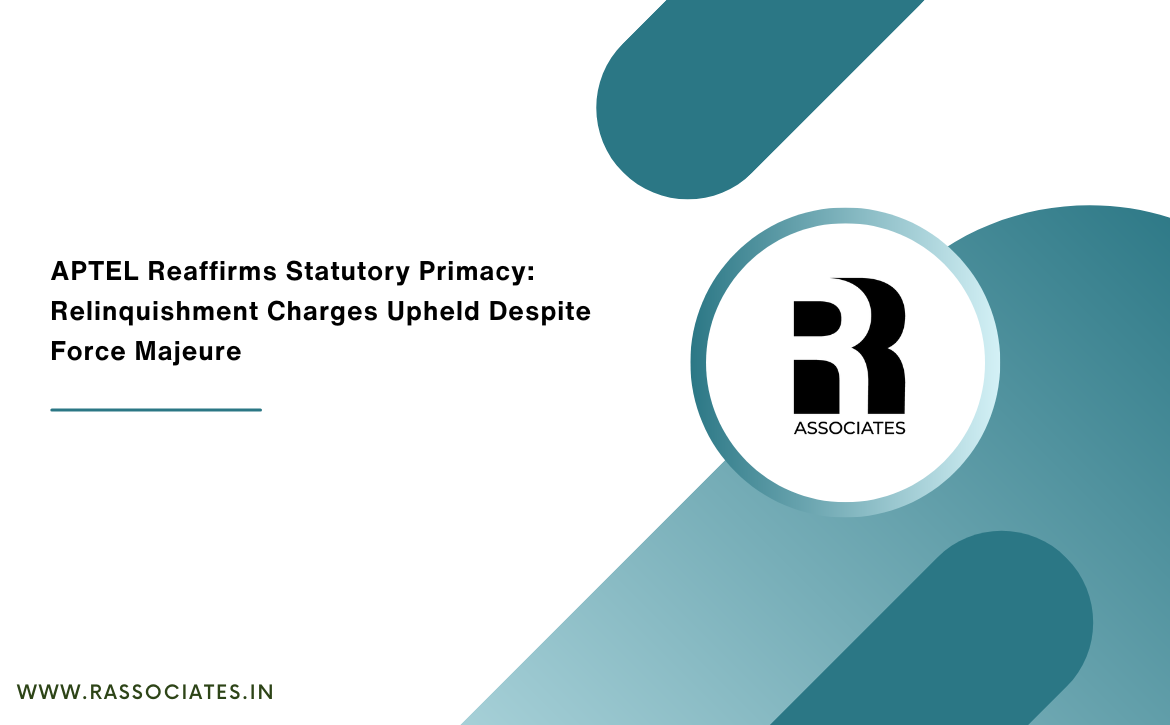
APTEL Reaffirms Statutory Primacy: Relinquishment Charges Upheld Despite Force Majeure
The dispute centred around the grant of Long-Term Access (‘LTA’) and the execution of a Bulk Power Transmission Agreement (‘BPTA’) between Aryan Renewable Energy Private Limited (‘Aryan Renewable’) and Central Transmission Utility (‘CTU’) for evacuation of power from Aryan Renewable’s proposed 1200 MW thermal power project at Amelia, Madhya Pradesh.
Background
Aryan Renewable proposed to set up a 1200 MW thermal power project in Madhya Pradesh and was granted LTA for the evacuation of power through the inter-State transmission system. Pursuant to the grant of LTA, a BPTA was executed, and the Appellant furnished a bank guarantee towards its transmission obligations.
Subsequently, the Central Water Commission declined to grant the No-Objection Certificate for water drawal, rendering the project non-implementable. Aryan Renewable contended that this constituted a force majeure event and that no unit of the generating station ever achieved commercial operation.
Thereafter, the bank guarantee submitted by Aryan Renewable were invoked, and the Central Electricity Regulation Commission (‘CERC’), vide the Impugned Order, held that Aryan Renewable remained liable to pay transmission and relinquishment charges under Regulation 18 of the Connectivity Regulations, 2009. Aggrieved, Aryan Renewable preferred an Appeal before the Hon’ble Appellate Tribunal.
Issues Framed by the Hon’ble Appellate Tribunal
- Whether Regulation 18 of the Connectivity Regulations, 2009 applies to a “zero-day failure” case, where LTA was never availed due to Force Majeure?
- Whether binding precedent by this Hon’ble Tribunal exists on the above
- Whether independently of precedent, the text of Regulation 18 contains a casus omissus regarding zero-use scenarios due to force majeure events, which is governed exclusively by the BPTA
- Whether Force Majeure under the BPTA overrides the statutory obligation to pay relinquishment charges under Regulation 18?
Analysis
Issue 1: Applicability of Regulation 18 to “zero-day failure”
1(a): Whether binding precedent exists
Aryan Renewable’s case primarily rests on Brahmani Thermal Power Private Limited v. CERC & Ors. passed by the Appellate Tribunal [Judgement dated 20.03.2025], where Regulation 18 was interpreted as—
(i) it applies solely to voluntary relinquishment of LTA “out of its wish”, having “no application” to compulsory exits due to unforeseeable force majeure events beyond control;
(ii) it presupposes actual stranded transmission capacity from such relinquishment, which is absent if lines are not commissioned or are utilised by others; and
(iii) LTA granted to generators activates only post-commercial operation, so no transmission charges liability arises where force majeure prevents project establishment altogether.
Aryan Renewable also relied on PEL Power Ltd. v. CERC and Himachal Sorang Power Pvt. Ltd. v. CERC, arguing that these decisions collectively constitute binding precedent excluding ‘zero-use’ cases from the scope of Regulation 18. The Hon’ble Appellate Tribunal rejected this submission. It noted that the judgments relied upon did not consider the full statutory framework of the Connectivity Regulations, 2009, particularly the interrelationship between Regulations 14, 15 and 18. The Hon’ble Appellate Tribunal held that the Brahmanijudgment impermissibly read additional words into Regulation 18 by restricting its application to voluntary relinquishment alone, contrary to settled principles of statutory interpretation. The Hon’ble Appellate Tribunal reiterated that a judgment is binding only for what it actually decides, and observations made without consideration of relevant statutory provisions do not qualify.
1(b): Whether the text of Regulation 18 contains a casus omissus
Independently, Aryan Renewable contended that Regulation 18 uses the phrase “have availed access rights” in both its categories, implying the provision applies only where access has been operationalised, and that a zero-use case therefore, falls outside its scope as a casus omissus.
The Hon’ble Appellate Tribunal rejected this contention. Through a harmonised reading of the definitions of ‘LTA’ and “long-term customer” under the Connectivity Regulations, 2009, the Hon’ble Appellate Tribunal held that the right to use the inter-State transmission system is conferred upon grant of LTA by the CTU, which is thereafter formalised through execution of the BPTA under Regulation 15. Regulation 14 was construed to distinguish between the grant of access and the date from which such access becomes operational.
The Hon’ble Appellate Tribunal held that where access is relinquished after grant but before commissioning, the period of utilisation is necessarily zero years, which squarely falls within Regulation 18(1)(b), applicable to customers who have not availed access rights for at least twelve years. Consequently, the zero-day failure scenario is not an omitted case under the Regulations, and the plea of casus omissus was found to be without merit.
2. Whether Force Majeure under the BPTA overrides the statutory obligation to pay relinquishment charges under Regulation 18
Aryan Renewable argued that Clause of the BPTA dealing with force majeure operates as an overriding provision absolving it from all liabilities, including relinquishment charges. TheHon’ble Appellate Tribunal rejected this submission by emphasising the primacy of statutory regulations over contractual arrangements.
The Hon’ble Appellate Tribunal relied on the Constitution Bench decision of the Hon’ble Supreme Court in PTC India Ltd. v. CERC to reiterate that regulations framed under Section 178 of the Electricity Act, 2003, have the force of subordinate legislation and override contractual provisions.
The Hon’ble Appellate Tribunal further held that Clause of the BPTA merely exempts parties from claims for loss or damage arising from force majeure and does not extend to statutory transmission or relinquishment charges, which form part of a pooled, non-discriminatory transmission framework. Transmission charges are not payable to CTU alone but are shared among Designated ISTS Customers under the Sharing Regulations, and therefore cannot be characterised as contractual damages.
In the absence of a force majeure exception in Regulation 18 itself, and given the statutory treatment of the Connectivity Regulations, the Hon’ble Appellate Tribunal concluded that Clauses of the BPTA cannot override the obligation to pay relinquishment charges under Regulation 18(1)(b). The appeal was therefore, dismissed as being devoid of merit.
Conclusion
The Hon’ble Appellate Tribunal judgment placed an emphasis on the statutory nature of the Connectivity Regulations 2009, making it clear that they were not to be superseded by the BPTA, and that there was no cassus omissus in Regulation 18 underlining the importance of construing the same in a harmonious matter.
Read More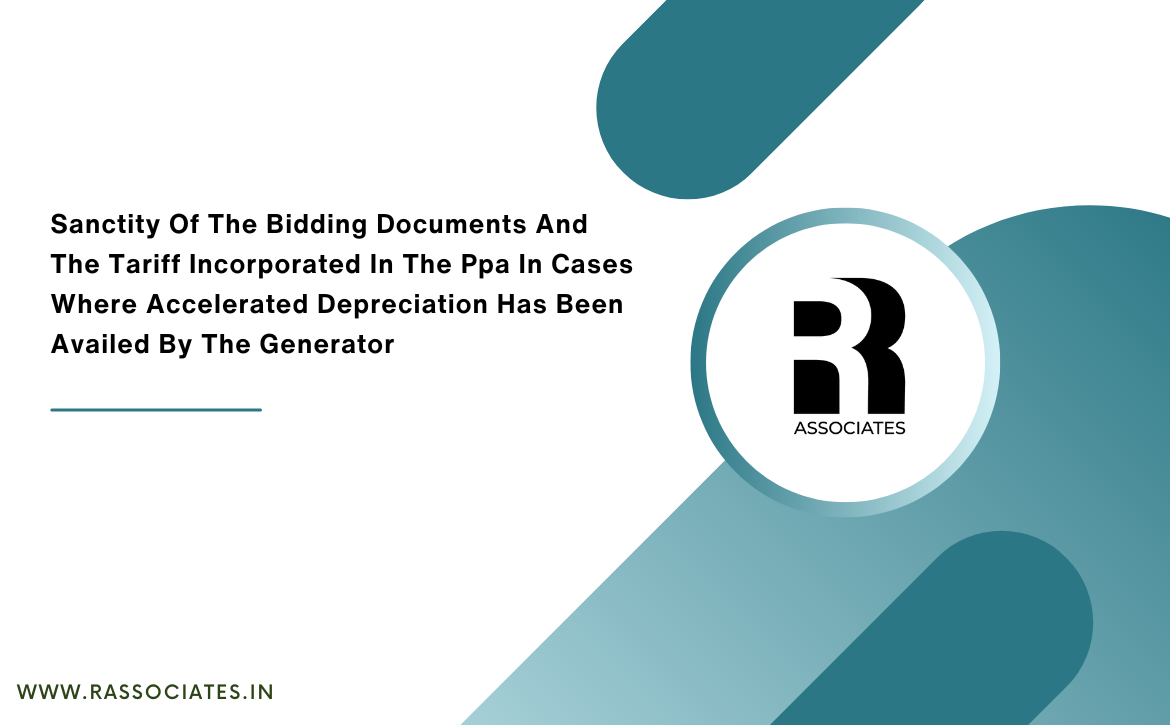
Sanctity Of The Bidding Documents And The Tariff Incorporated In The Ppa In Cases Where Accelerated Depreciation Has Been Availed By The Generator
The dispute revolves around the nature of depreciation availed by Mokia Green Energy Pvt. Ltd. (“Appellant”) and its consequent impact on tariff charged as per the Power Purchase Agreement (“PPA”) which was executed following a Request for Proposal (“RfP”) and Competitive Bidding Process. The Hon’ble Appellate Tribunal vide its Judgement dated 08.01.2026 in Appeal 323 of 2025 has dismissed the appeal filed by the Appellant and held that tariff has to necessarily be reduced on availment of Accelerated Depreciation.
Background
In 2013, a RfP was issued by Punjab Electricity Development Agency (“PEDA”) where it was stipulated that if at any stage it is found that project availing normal rate of depreciation is claiming Accelerated Depreciation, then tariff would be revised as per the Punjab State Electricity Regulation Commission (“PSERC”) tariff applicable for Accelerated Depreciation, with effect from the date of commissioning.
The Appellant was one of the successful bidders and had declared that it will avail for normal rate of depreciation. Consequently, the Appellant and Punjab State Power Corporation Ltd. (“PSPCL”) entered into a PPA. However, later it was discovered that the Appellant was availing Accelerated Depreciation and, consequently PSPCL issued a notice of demand for reducing the applicable tariff. The Appellant had furnished a specific undertaking before signing the PPA that the Appellant will not avail Accelerated Depreciation.
Issues Framed by the Hon’ble Appellate Tribunal
- Whether the rate of depreciation, i.e. 80% claimed by the Appellant constitutes as Accelerated Depreciation?
- Assuming the Appellant had claimed accelerated depreciation, whether PSPCL can revise the tariff in the absence of a specific provision in the PPA?
- Whether PSPCL can direct the Appellant to pass on or refund any amount in the absence of any financial benefit having accrued to it?
Analysis
Issue 1: Accelerated Depreciation
The Hon’ble Appellate Tribunal examined the scheme of Section 32 of the Income Tax Act, 1961 (“IT Act”) and noted that it provides two alternative depreciation regimes. Depreciation under Section 32(1)(i), read with Appendix IA and Rule 5(1A) of the Income-tax Rules, 1962 (“IT Rules”), applies the straight-line method and prescribes a rate of 7.69% for solar power generating systems. In contrast, depreciation under Section 32(1)(ii), read with Appendix I and Rule 5(1) of the IT Rules, follows the written down value method and permits a substantially higher rate of depreciation of 80%/40%.
The Hon’ble Appellate Tribunal held that the depreciation regime yielding higher depreciation in the initial years necessarily constitutes “accelerated depreciation”, and the absence of the express term in Section 32(1)(ii) does not alter its substantive character. Since the Appellant admittedly claimed depreciation under Section 32(1)(ii) at the rate of 80%/40%, it was rightly held to have availed accelerated depreciation.
Issue 2: Entire Agreement Clause in the PPA
In so far as arguments of the Appellant concerning “entire agreement” clause in the PPA, theHon’ble Appellate Tribunal emphasised that tariff is not a standalone numerical figure and cannot be read in isolation. It is inextricably linked to the competitive bidding process conducted pursuant to the RfP, and is therefore inherently subject to the terms and conditions stipulated therein.
The Hon’ble Appellate Tribunal noted that the Preamble to the PPA expressly recognises the Implementation Agreement (“IA”), which unequivocally binds the Company to act in accordance with the terms of the RfP. In light of this contractual framework, it was held that the IA forms an inseparable part of the PPA, thereby binding the Appellant to the conditions of the RfP notwithstanding the presence of an “entire agreement” clause.
The Hon’ble Appellate Tribunal further rejected the Appellant’s contention that the Undertaking, whereby it committed to avail only normal depreciation, ought to be read down in the event of inconsistency with the PPA. It was held that such an undertaking cannot be rendered redundant merely because the consequences of its breach were not expressly restated in the PPA. In the event of such a lacuna, the consequences must necessarily be imported from the bidding documents, which constitute the foundation of the contractual relationship.
Issue 3: Benefit Accrued on account of Accelerated Depreciation
The Appellant contended that even if it were held to have availed accelerated depreciation, no benefit was required to be passed on since it was a loss-making entity and had derived no actual financial gain. This contention was rejected on the ground that the accrual of benefit was immaterial. The RfP and the tariff determined by PSERC expressly provided for differential tariffs depending on whether accelerated depreciation was availed, irrespective of the generator’s profitability. Consequently, the tariff was required to be revised in accordance with the RfP, and the question of whether the Appellant had actually benefited from accelerated depreciation was held to be irrelevant.
Conclusion
The Hon’ble Appellate Tribunal’s judgment underscores that generators are bound by their undertakings. It further reiterates the need for harmonious construction of contractual documents and affirms that tariff revision will follow in case the generators resile on their commitment to avail normal depreciation, independent of any actual benefit accrued by the generator.
Judgement Link
Read More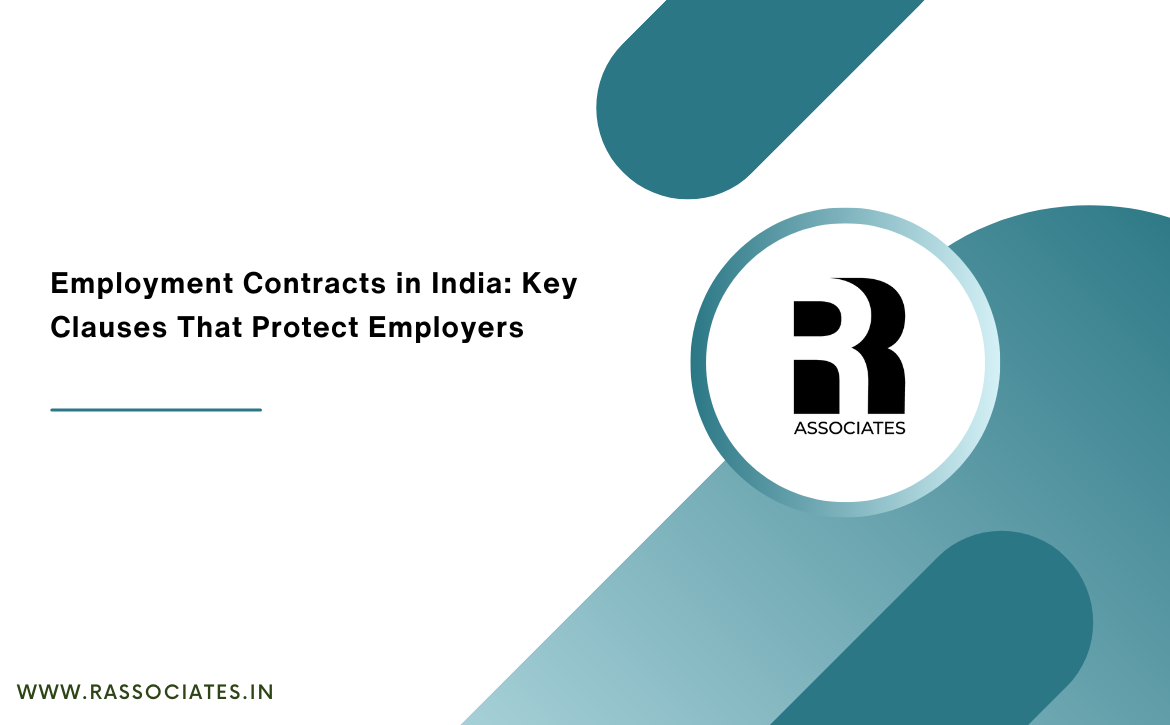
Employment Contracts in India: Key Clauses That Protect Employers
Why Employment Contracts Matter More Than Ever?
In India, employment relationships are often mistakenly viewed as being governed primarily by labour statutes. In reality, the employment contract in India is the first and most critical legal instrument that defines rights, obligations, and risk allocation between employer and employee. When properly drafted, an employment contract serves as a powerful risk-management tool and a strong line of defence for employers.
With rising employee litigation, heightened data protection concerns, increased instances of moonlighting, and closer regulatory scrutiny, generic appointment letters are no longer sufficient. Employers today require employer-friendly employment contracts that are customised, legally sound, and carefully aligned with Indian labour and employment laws.
This article analyses the most important employment agreement clauses that protect employers, explains their legal relevance, and highlights best practices to ensure an enforceable employment contract in India.
Appointment and Scope of Employment Clause
The appointment and scope of employment clause establishes the foundation of the employment relationship. It defines the employee’s designation, reporting structure, and core responsibilities, thereby eliminating ambiguity from the outset. From an employer’s perspective, clarity in this clause is essential to prevent future disputes relating to role expectations or alleged underutilization.
How it protects employers
A clearly defined scope of employment:
- Prevents employees from claiming responsibilities beyond their assigned role
- Protects employers from allegations of role dilution or underutilisation
- Provides a clear benchmark for performance evaluation and disciplinary action
Employers should avoid vague job descriptions and include language allowing reasonable modification of duties in line with evolving business requirements. This flexibility is essential in a dynamic commercial environment.
Probation Clause
The probation clause serves as a risk-mitigation tool during the early stages of employment. It enables employers to assess whether an employee is suitable for the role before confirming permanent employment. Probationary employment offers employers greater discretion, especially with respect to termination.
Employer protection
A well-drafted probation clause:
- Permits termination with shorter notice or without notice (if contractually specified)
- Minimises exposure to wrongful termination claims during the initial employment period
To be effective, the probation clause must clearly specify the duration of probation, the employer’s right to extend it, and the notice requirements applicable during this period. Employers should avoid automatic confirmation upon expiry of probation. Instead, confirmation should be conditional upon written approval, ensuring that silence or inaction does not inadvertently create permanent employment rights.
Term and Termination Clause
Termination-related disputes account for a significant proportion of employment litigation in India, making this clause one of the most critical components of an employment contract in India. The termination clause must strike a balance between employer discretion and statutory compliance.
Employer-protective elements
- Termination for convenience with notice or salary in lieu
- Immediate termination for misconduct, fraud, or breach of trust
- Garden leave provisions
- Clear differentiation between termination and statutory retrenchment
However, termination clauses must be carefully drafted to comply with applicable labour laws, especially where employees qualify as “workmen.” Best practice is to adopt differentiated termination frameworks for managerial employees and statutory workers to preserve enforceability.
Confidentiality Clause
Confidentiality clauses are indispensable in protecting proprietary information, trade secrets, and sensitive business data. In the absence of a robust confidentiality framework, employers may find it difficult to restrain former employees from misusing confidential information or to seek effective legal remedies.
Employer protection
It enables employers to:
- Prevent misuse or disclosure of confidential information
- Seek injunctions and damages for breach of confidence
- Strengthen enforcement during and after employment
To enhance enforceability, confidentiality obligations should be clearly defined and extend beyond the termination of employment. Vague or overly broad definitions often weaken enforcement. Instead, employers should specify the categories of confidential information and emphasise the continuing nature of the obligation, which strengthens the employer’s position in seeking injunctions or damages.
Intellectual Property (IP) Ownership Clause
Intellectual property ownership clauses are particularly critical for employers in technology-driven, creative, and knowledge-based industries. This clause ensures that all work created during the course of employment vests exclusively with the employer.
Employer protection
It prevents employees from asserting ownership over inventions, designs, software, or other intellectual property developed during employment or using company resources.
The clause should explicitly cover inventions, designs, software, documentation, and other forms of intellectual output. It should also impose an obligation on employees to assist with IP registration and enforcement even after termination. Employers frequently overlook moral rights waivers where legally permissible, which can later impede commercial exploitation of IP assets.
Non-Solicitation Clause
Non-solicitation clauses play a vital role in protecting business relationships after an employee exits the organisation. Unlike post-employment non-compete clauses, non-solicitation restrictions are generally upheld by Indian courts if they are reasonable in duration and scope.
To improve enforceability, employers should restrict only active solicitation rather than passive acceptance of business. The clause should also be limited to clients, customers, or employees with whom the departing employee had material interaction. Overbroad restrictions often fail judicial scrutiny.
Non-Compete Clause (With Caution)
Under Indian law, post-employment non-compete clauses are largely unenforceable. However, employers can still protect their interests by enforcing non-compete obligations during the term of employment and by indirectly restricting competitive conduct through strong confidentiality and non-solicitation clauses.
Rather than relying on blanket non-compete restrictions, employers should focus on protecting legitimate business interests such as confidential information, proprietary processes, and client relationships. This approach significantly improves the likelihood of judicial enforcement.
Exclusivity and Moonlighting Clause
With the rise of remote work, exclusivity and moonlighting clauses have become increasingly important. These clauses restrict employees from engaging in parallel employment or activities that create conflicts of interest.
Employer protection
- Prevents conflicts of interest
- Safeguards productivity and loyalty
- Particularly relevant in remote and hybrid work models
To withstand legal scrutiny, the clause should clearly define what constitutes a conflict of interest, permit limited exceptions for disclosed passive investments, and outline disciplinary consequences for violations.
Code of Conduct and Disciplinary Clause
A well-integrated code of conduct and disciplinary clause provides employers with a structured mechanism to address misconduct. It strengthens the employer’s position in disciplinary proceedings and supports termination decisions when challenged before courts or labour authorities.
Employer protection
- Enables structured disciplinary processes
- Supports termination for misconduct
- Strengthens defence in employment litigation
Employers should incorporate the code of conduct by reference and reserve the right to amend internal policies. Linking violations to defined disciplinary outcomes enhances transparency and legal defensibility.
Data Protection and IT Usage Clause
Data protection and IT usage clauses regulate employee interaction with company systems, devices, and data. These clauses are essential for limiting employer liability arising from data breaches and for justifying monitoring of official systems.
Employer protection
- Reduces liability arising from data breaches
- Justifies monitoring of official systems
- Supports internal investigations
The clause should establish employer ownership of data, define monitoring rights, and impose obligations to return or delete data upon exit. Such provisions are increasingly relevant in light of evolving data protection standards.
Notice Period and Garden Leave Clause
Notice period and garden leave clauses ensure continuity during employee exit. They provide employers with time to transition responsibilities and protect sensitive information.
Employer advantage
- Facilitates smooth transition of responsibilities
- Restricts immediate joining of competitors
- Allows controlled access during sensitive periods
Employers should retain discretion to waive notice, pay salary in lieu, or enforce garden leave depending on business requirements. This flexibility is a hallmark of an employer-friendly employment contract.
Dispute Resolution and Jurisdiction Clause
Dispute resolution clauses allow employers to control how and where employment disputes are resolved. Specifying exclusive jurisdiction prevents litigation in inconvenient forums, while arbitration clauses—when appropriately drafted—can reduce time and costs, particularly for senior employees.
Employer protection
- Prevents litigation in inconvenient jurisdictions
- Allows arbitration for senior or managerial employees
- Reduces cost and time involved in disputes
Such clauses must be role-specific and carefully structured to avoid enforceability challenges.
Amendment and Waiver Clause
Amendment and waiver clauses prevent implied contractual changes arising from conduct or informal communications. By requiring written amendments, employers protect themselves against unintended dilution of rights.
Survival Clause
Survival clauses ensure that key obligations—such as confidentiality, intellectual property ownership, non-solicitation, and dispute resolution—continue even after termination, reinforcing long-term protection.
Conclusion
A carefully drafted employment contract in India is not a procedural formality but a strategic legal instrument. Employers who invest in robust and compliant employment agreement clauses significantly reduce exposure to disputes, intellectual property theft, client poaching, and regulatory penalties. In today’s legal environment, poor drafting is invariably more expensive than sound legal advice.
Need Help Drafting or Reviewing Employment Contracts?
Every organisation requires role-specific and industry-specific contracts to ensure an enforceable employment contract in India. Generic templates often fail to withstand legal scrutiny.
R Associates advises employers on drafting and reviewing employer-friendly employment contracts that are commercially practical, legally compliant, and aligned with evolving Indian labour laws. Professional legal structuring at the contract stage can prevent costly disputes later.
Read More
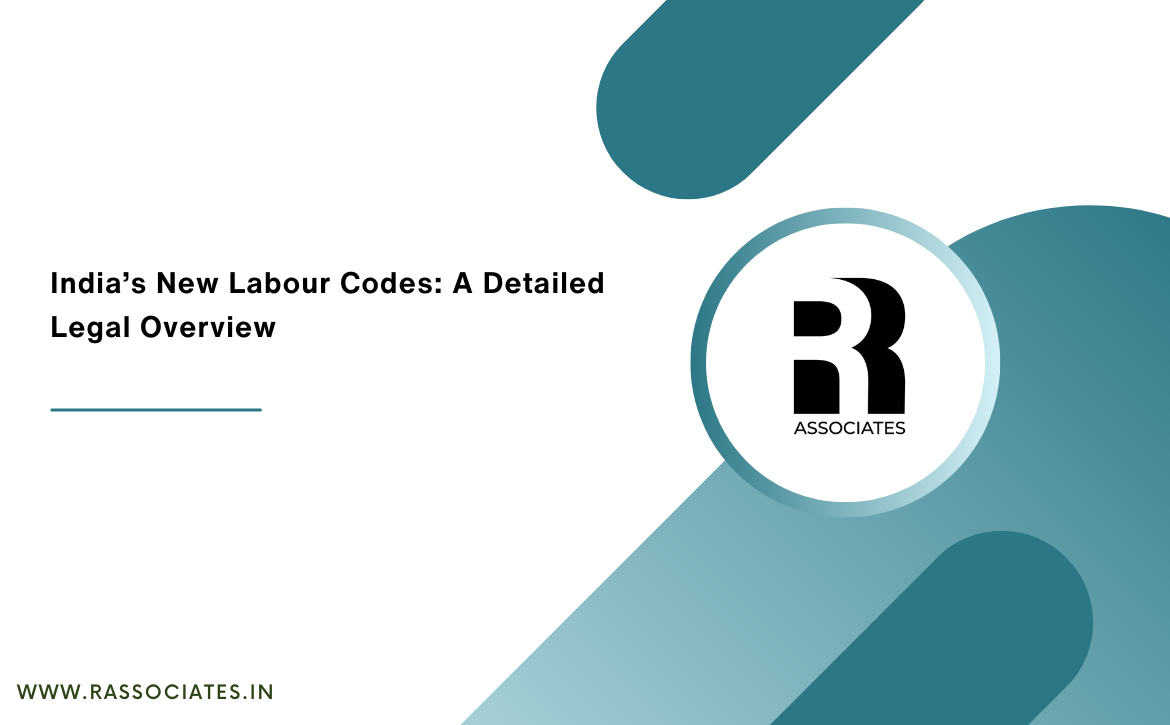
India’s New Labour Codes: A Detailed Legal Overview
Read the Labour Codes compliance framework in detail
India has undertaken one of the most far-reaching labour law reforms since Independence by consolidating 29 central labour legislations into four Labour Codes. The reform seeks to simplify India’s complex labour law framework, reduce multiplicity of compliances, enhance ease of doing business, and simultaneously ensure better protection and social security for workers. These Codes are expected to significantly alter employer–employee relationships across sectors.
Objectives Behind the Labour Code Reforms
The primary objectives of the Labour Code reforms include rationalisation of existing labour laws, uniformity in definitions and compliance mechanisms, reduction in litigation arising out of overlapping provisions, and extension of statutory benefits to unorganised, gig, and platform workers. The reforms also aim to encourage formalisation of employment while maintaining industrial harmony.
1. Code on Wages, 2019
The Code on Wages, 2019 consolidates four wage-related legislations, namely the Payment of Wages Act, 1936, Minimum Wages Act, 1948, Payment of Bonus Act, 1965, and Equal Remuneration Act, 1976. One of the most significant changes introduced is a uniform definition of the term ‘wages’ applicable across labour Laws.
The Code empowers the Central Government to fix a national floor wage, taking into account minimum living standards. State Governments must ensure that minimum wages fixed by them are not lower than the floor wage. The Code also strengthens provisions relating to timely payment of wages and prohibits gender-based discrimination in matters of remuneration.
2. Industrial Relations Code, 2020
The Industrial Relations Code, 2020 consolidates the Industrial Disputes Act, 1947, the Trade Unions Act, 1926, and the Industrial Employment (Standing Orders) Act, 1946. The Code seeks to balance the need for flexibility for employers with safeguards for workers’ rights. A notable feature is the introduction of the concept of a negotiating union or negotiating council to streamline
collective bargaining. The threshold for prior government approval for layoffs, retrenchment, and closure has been increased from 100 to 300 workers, providing operational flexibility to establishments.
3. Code on Social Security, 2020
The Code on Social Security, 2020 is one of the most progressive aspects of the labour reforms. It consolidates key social welfare legislations such as the Employees’ Provident Funds Act, Employees’ State Insurance Act, Payment of Gratuity Act, and the Maternity Benefit Act.
For the first time, the Code recognises gig workers, platform workers, and unorganised workers and enables the formulation of social security schemes for them. It also provides for a national social security database and simplified digital registration processes.
4. Occupational Safety, Health and Working Conditions Code, 2020
The Occupational Safety, Health and Working Conditions Code consolidates 13 labour laws relating to workplace safety, health, and welfare. It aims to provide a uniform regulatory framework across factories, mines, construction sites, and other establishments.
The Code introduces common registration and licensing mechanisms, prescribes standard working conditions, and includes specific provisions for employment of women during night shifts subject to safety measures.
Implementation Status and Way Forward
Although all four Labour Codes have received Presidential assent, their enforcement depends upon notification of rules by the Central Government and adoption by State Governments. As labour is a subject under the Concurrent List, employers must closely monitor state-specific developments. Businesses are advised to proactively review employment contracts, wage structures, HR policies, and compliance frameworks to ensure readiness once the Codes are fully implemented.
Conclusion
The new Labour Codes represent a paradigm shift in India’s labour law landscape. While they promise simplified compliance and broader social security coverage, their successful implementation will depend on clarity in rule-making and effective enforcement. Employers and professionals should seek timely legal advice to navigate this evolving regulatory environment.
Read More
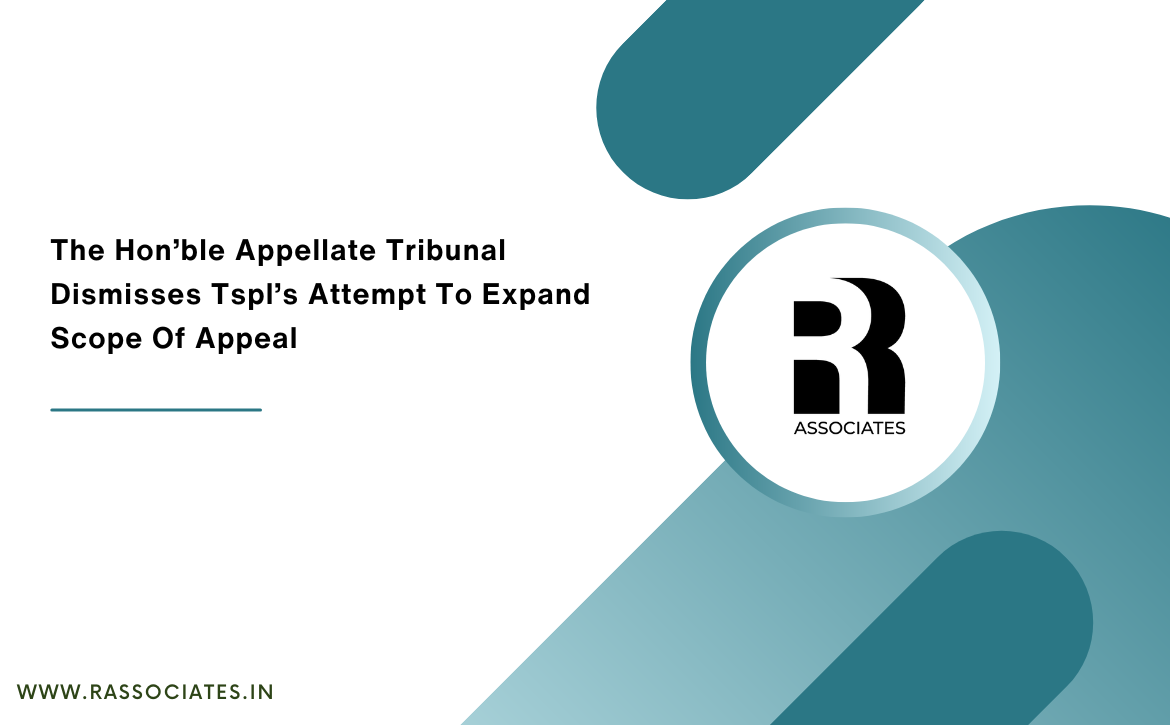
The Hon’ble Appellate Tribunal Dismisses Tspl’s Attempt To Expand Scope Of Appeal
Introduction
On 03.11.2025, the Hon’ble Appellate Tribunal of Electricity (the ‘Hon’ble Tribunal’) pronounced the judgment in the matter between Talwandi Sabo Power Limited (‘TSPL’) and Punjab State Electricity Regulatory Commission (the ‘State Commission’). While doing so, the Hon’ble Tribunal has ruled in the favour of Punjab State Power Corporation Limited (‘PSPCL’) and observed that the Application filed by TSPL seeking deemed capacity charges for the year 2014 on account of alleged failure on the part of PSPCL to arrange adequate quantity as well as quality of coal for its power project is beyond the scope of the present appeal. It also held that claims not pleaded or argued before the State Commission cannot be raised for the first time before the Hon’ble Tribunal.
Background
The appeal presently before the Hon’ble Tribunal arises from orders dated 06.09.2016 and 08.09.2016 passed by the State Commission in Petitions No. 11 of 2012 and 46 of 2012. These proceedings were remanded by the Hon’ble Tribunal through its judgment dated 07.04.2016 (in Appeal Nos. 56 & 84 of 2013) wherein the State Commission was required to pass consequential orders in terms of directions given in the remand judgment.
However, TSPL—nearly nine years later—attempted to inject a fresh, never sought claims relating to deemed capacity charges for the periods July–October 2014 and December 2014allegedly arising from PSPCL’s supposed failure to supply adequate coal.
This claim had its own separate procedural trajectory. TSPL had raised it only in Petition No. 34 of 2015, distinct from the present appeal, which the State Commission referred to arbitration in December 2015.
In the arbitral proceedings arising from the State Commission’s reference in Petition No. 34 of 2015, TSPL sought, by way of a belated amendment application filed on 20.01.2024, to introduce a new claim for deemed capacity charges for the 2014 period, a claim that had never formed part of the disputes originally referred to arbitration. The Arbitral Tribunal, by its order dated 31.07.2025, rejected the amendment, holding that the 2014 claim fell outside the scope of the reference and could not be imported through an afterthought pleading.
When the Arbitral Tribunal limited the scope of its jurisdiction to the terms of reference and declined to examine the 2014 deemed availability claim, TSPL attempted to bring the issue into the Appeal No. 331 of 2016 pending before the Hon’ble Tribunal, as a supplementary pleading through an I.A. for Urgent Listing filed in September, 2025.
Submission Made by the Parties
TSPL essentially argued as under:
- The company would be left “remediless” because the Arbitral Tribunal had declined to adjudicate it.
- The issue ought to be adjudicated to avoid multiplicity of proceedings.
- PSPCL had allegedly stated before the Arbitral Tribunal that the 2014 claim was “subsumed” within the pending appeal before the Hon’ble Appellate Tribunal.
- While the arbitral proceedings would address the plea of force majeure raised by it, the issue concerning PSPCL’s coal supply obligation for the year 2014 remained to be adjudicated on merits and, therefore, rightly falls within the scope of the present appeal for consideration by the Hon’ble Tribunal.
PSPCL’s key arguments were as under:
- The 2014 claim was never part of Petitions 11/2012 or 46/2012. Thus, it could not be retrofitted into an appeal arising out of those petitions.
Note: In fact, the Hon’ble Tribunal has confirmed that no pleadings, prayers, submissions, or issues relating to the 2014 deemed capacity claim exist anywhere in the proceedings giving rise to this appeal. - TSPL already pursued the 2014 claim separately and failed to amend arbitration. TSPL is bound by its choice to raise the 2014 claim in Petition 34/2015. PSPCL pointed out that the 2014 deemed-capacity claim appeared for the first time in Petition 34 of 2015, which was referred to arbitration. When TSPL later sought, in January 2024, to amend the arbitral pleadings to add this claim, the Arbitral Tribunal rejected the amendment on 31.07.2025, holding that the claim was outside the scope of the reference. Having failed in arbitration, TSPL could not now use this appeal as a substitute original forum.
- No jurisdiction can be created by alleged “admissions” or equitable pleas. PSPCL, clarified that it never admitted that the 2014 claim fell within this appeal. Any references made during arbitration were jurisdictional objections, not concessions. In any event, PSPCL argued, jurisdiction cannot arise from a party’s statement, and an appellate court cannot decide a dispute never adjudicated below.
- Jurisdiction cannot be created by assertions of “prejudice”: Even if an arbitral ruling constrains TSPL, the remedy lies in challenging the arbitral order, not reshaping the pending appeal.
- TSPL, under the pretext of seeking urgent listing, was in fact attempting to raise a new claim for capacity charges for the year 2014, a matter that was never decided by the State Commission, nor part of the present appeal. PSPCL emphasized that TSPL had not filed any application to amend its appeal under Order VI Rule 17 CPC, rendering the request procedurally defective.
Analysis and Conclusion
The Hon’ble Tribunal while appreciating the submissions of PSPCL took a view that the held that the claim sought to be introduced by TSPL was beyond the scope of the pending appeal and therefore not maintainable.
The Hon’ble Tribunal observed that the present appeal (Appeal No. 331 of 2016) emanates from the orders dated 06.09.2016 and 08.09.2016 passed by the State Commission in Petitions Nos. 11 and 46 of 2012, which themselves were remanded for limited reconsideration pursuant to the Tribunal’s earlier judgment dated 07.04.2016 in Appeal Nos. 56 and 84 of 2013. The issues in those proceedings were confined to the question of PSPCL’s obligation to execute the Fuel Supply Agreement (FSA) and the Fuel Transportation Agreement (FTA) with Mahanadi Coalfields Limited and the Indian Railways, respectively.
In contrast, the claim for deemed capacity charges for the year 2014 arose subsequently and was raised by TSPL for the first time in Petition No. 34 of 2015, which had been referred to arbitration by the State Commission vide order dated 07.12.2015. The Hon’ble Tribunal has duly observed that TSPL could not use the present appeal to cure that jurisdictional defect or bypass the arbitral rejection.
In light of the above, the concluded that the claim of appellant for deemed capacity charges pertaining to the year 2014 on account of alleged failure on the part of PSPCL to arrange adequate quantity as well as quality of coal for its power project is totally alien to this appeal and therefore, appellant cannot be permitted to file any pleadings/documents/data/submissions etc. with regards to the same in this appeal, as sought vide prayer (b) of the application.
Thus, the above Judgment reinforces a critical principle of appellate discipline, that parties cannot expand or reshape the scope of an appeal to introduce fresh causes of action never adjudicated by the original forum. It strengthens procedural certainty in regulatory litigation by affirming that jurisdiction must be rooted in the pleadings and statutory architecture not in afterthought claims or strategic manoeuvring.
Appeal made by:
Reeha Singh and Shirin Gupta
Represented by:
Poorva Saigal, Shubham Arya and Reeha Singh in – TSPL Case
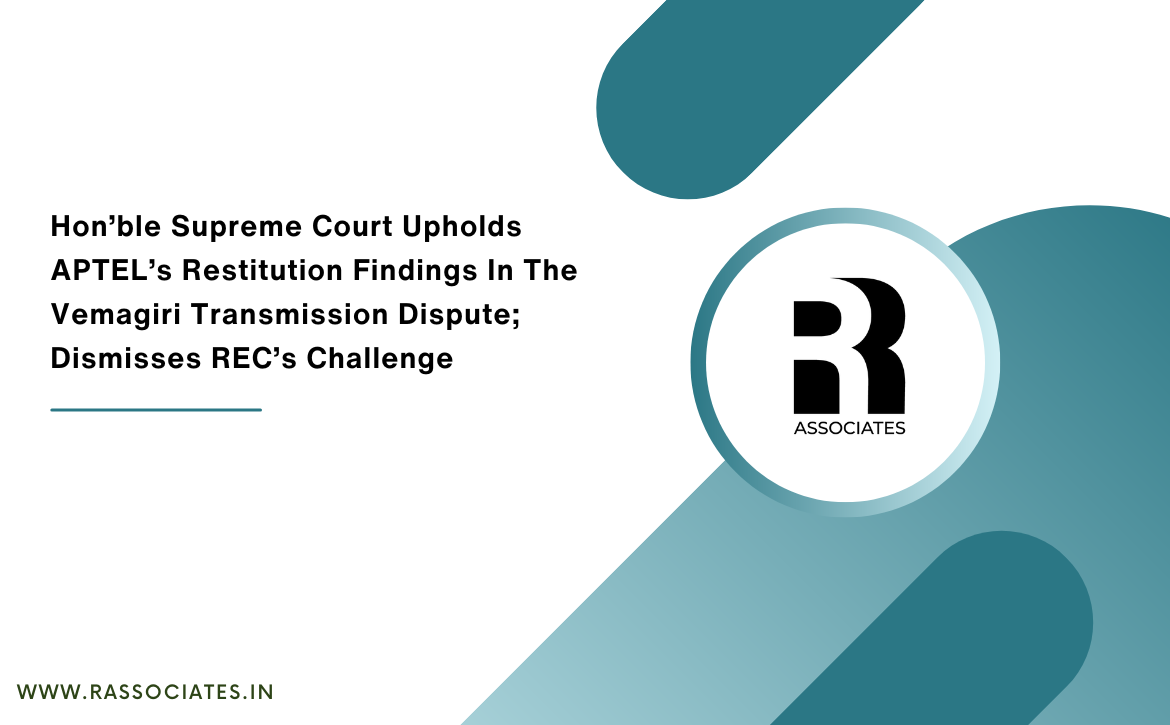
Hon’ble Supreme Court Upholds APTEL’s Restitution Findings In The Vemagiri Transmission Dispute; Dismisses REC’s Challenge
Introduction
On 10.10.2025, the Hon’ble Supreme Court of India dismissed Civil Appeal Nos. 11011–11013 of 2025 filed by REC Power Development and Consultancy Limited (REC), thereby affirming the judgment dated 27.05.2025 passed by the Hon’ble Appellate Tribunal for Electricity (APTEL).
The appeals concerned long-standing disputes surrounding the Vemagiri Transmission Project, developed under the Tariff-Based Competitive Bidding (TBCB) framework in terms of the Guidelines dated 17.04.2006. Central to the matter were issues of restitution, regulatory jurisdiction, and the extent to which a Bid Process Coordinator (BPC) could be held accountable for actions taken during the execution of the TBCB process.
R Associates represented Power Grid Corporation of India Limited (POWERGRID), the successful bidder for the transmission project, whose acquisition costs and subsequent expenses were under challenge.
The Hon’ble Supreme Court, affirming APTEL’s reasoning, declined to interfere with the detailed factual and legal findings, recognising that principles of fairness and restitution governed the dispute.
Background
The Vemagiri Transmission Project was initiated to evacuate power from the gas-based generation projects of Spectrum and Samalkot under a TBCB framework.
In 2012, REC, acting as BPC, insisted that POWERGRID proceed with acquisition of the Special Purpose Vehicle—Vemagiri Transmission System Limited (VTSL), despite the Ministry of Power’s notifications dated 14.03.2012 and 19.03.2012 indicating non-availability of domestic gas for the concerned generators.
Spectrum and Samalkot themselves had, in letters dated 30.03.2012 and 06.04.2012, sought cancellation or deferment of the Transmission Service Agreement (TSA). REC nevertheless required POWERGRID to acquire VTSL and pay the acquisition price of Rs. 18.27 crores.
Given this sequence, POWERGRID later sought restitution before the Central Electricity Regulatory Commission (CERC), leading to a series of proceedings culminating in APTEL’s judgment directing adjustment of costs and holding REC accountable for failing to defer acquisition despite clear grounds to do so.
APTEL held that:
- Spectrum and Samalkot were not liable for acquisition or operational costs;
- POWERGRID could not be saddled with costs it incurred under compelling circumstances;
- CERC must adjust these costs either by recovering the amount from REC or through other regulatory mechanisms.
REC challenged these findings before the Hon’ble Supreme Court.
Submission Made by the Parties
REC contended as under:
- CERC lacked jurisdiction over disputes involving BPC, as REC was only a pro forma party to the original proceedings.
- The acquisition was undertaken voluntarily by POWERGRID, despite indications regarding gas non-availability, and therefore no restitution could be claimed.
- APTEL erred in fastening liability upon REC when it was not a party to the TSA and had no role after initiating the bidding process.
POWERGRID’s key submissions were as under:
- REC, as BPC, failed in its statutory role:
Under Clause 2.4(e) of the Request for Proposal (RfP), REC had the express power to defer acquisition on account of material developments. Despite receiving letters from Spectrum and Ministry notifications regarding non-availability of gas, REC insisted on strict adherence to timelines and mandated payment of acquisition price. - POWERGRID acted without fault and under compelling circumstances:
POWERGRID highlighted that non-compliance would have resulted in encashment of its bid bond under Clause 2.7 of the RfP. As the selected bidder, POWERGRID had no discretion other than to fulfil bid terms.
- Certain Concurrent findings of CERC and APTEL:
Both authorities concurrently upheld that the acquisition price to be paid to POWERGRID is required to be reimbursed.
- CERC had jurisdiction over disputes involving a transmission licensee and BPC:
Relying on Section 79(1)(c) and (f) of the Act, POWERGRID submitted that disputes “in connection with” inter-State transmission, including those arising during bidding, acquisition, and TSA implementation, fall squarely within the Central Commission’s jurisdiction. Reference was also made to the wide interpretation of regulatory powers recognised in K. Ramanathan v. State of Tamil Nadu and Energy Watchdog v. CERC. - Restitution was the only equitable outcome:
POWERGRID urged that the economic position preceding compelled acquisition must be restored, especially when the project could not proceed due to reasons clearly beyond its control.
Analysis and Conclusion
The Hon’ble Supreme Court, after hearing all parties, declined to interfere with APTEL’s detailed factual findings and legal reasoning, observing that “…no grounds are made out to interfere with the impugned judgment/order passed by the Appellate Tribunal for Electricity, New Delhi, on principles of fairness as well as restitution.”
The Hon’ble Supreme Court has thereby affirmed:
- the correctness of APTEL’s restitution-based approach;
- the concurrent findings of CERC and APTEL that the concurrently upheld that the acquisition price to be paid to POWERGRID is required to be reimbursed.
- the power of CERC to adjudicate disputes involving BPCs when connected to inter-State transmission; and
- the accountability of the Bid Process Coordinator when its actions materially contribute to avoidable economic loss.
- By dismissing REC’s appeals, the Hon’ble Supreme Court has brought finality to more than a decade of litigation stemming from the aborted Vemagiri Transmission System. The decision reinforces jurisprudence on BPC obligations, regulatory oversight under Section 79, and the availability of restitutionary remedies within the TBCB framework.
Prepared By:
Reeha Singh
Represented by:
Shubham Arya, Poorva Saigal, Reeha Singh and Shirin Gupta
Read More
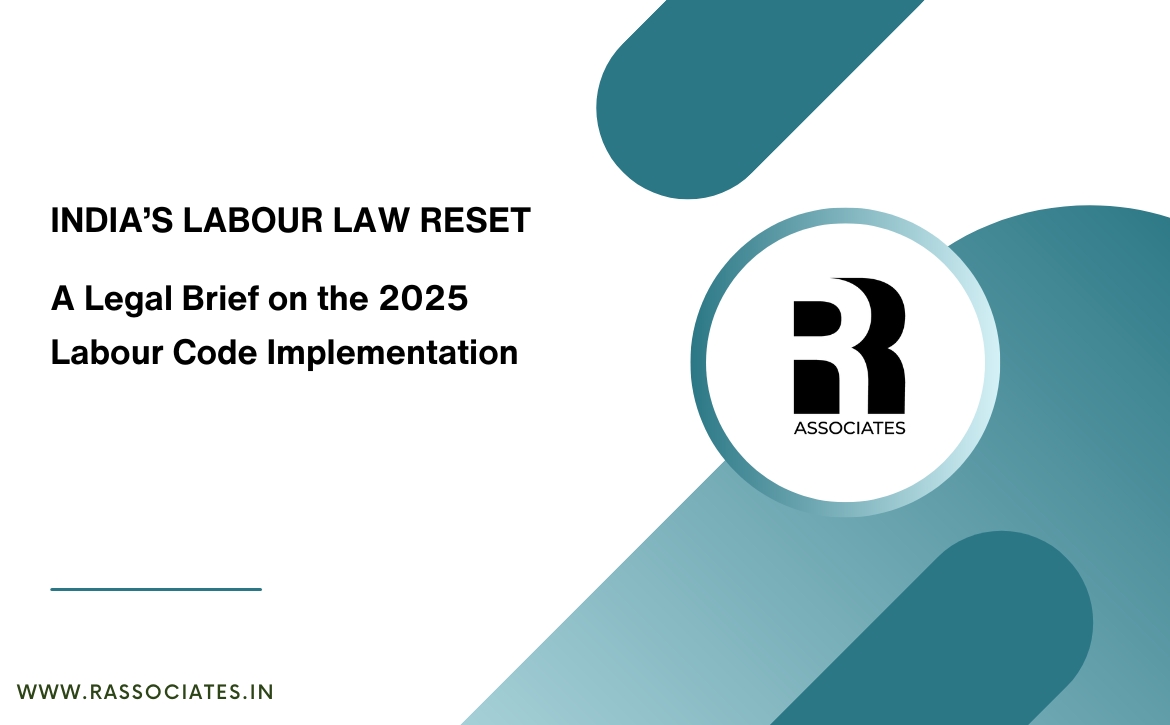
India’s Labour Law Reset
With the notification of the four Labour Codes on 21 November 2025, India has initiated a comprehensive overhaul of its labour regulation framework. This analysis outlines the codification’s impact, expanded wage definitions, changes to industrial relations, contract labour restrictions, and the compliance roadmap for employers navigating a partially harmonised legal landscape.
Read More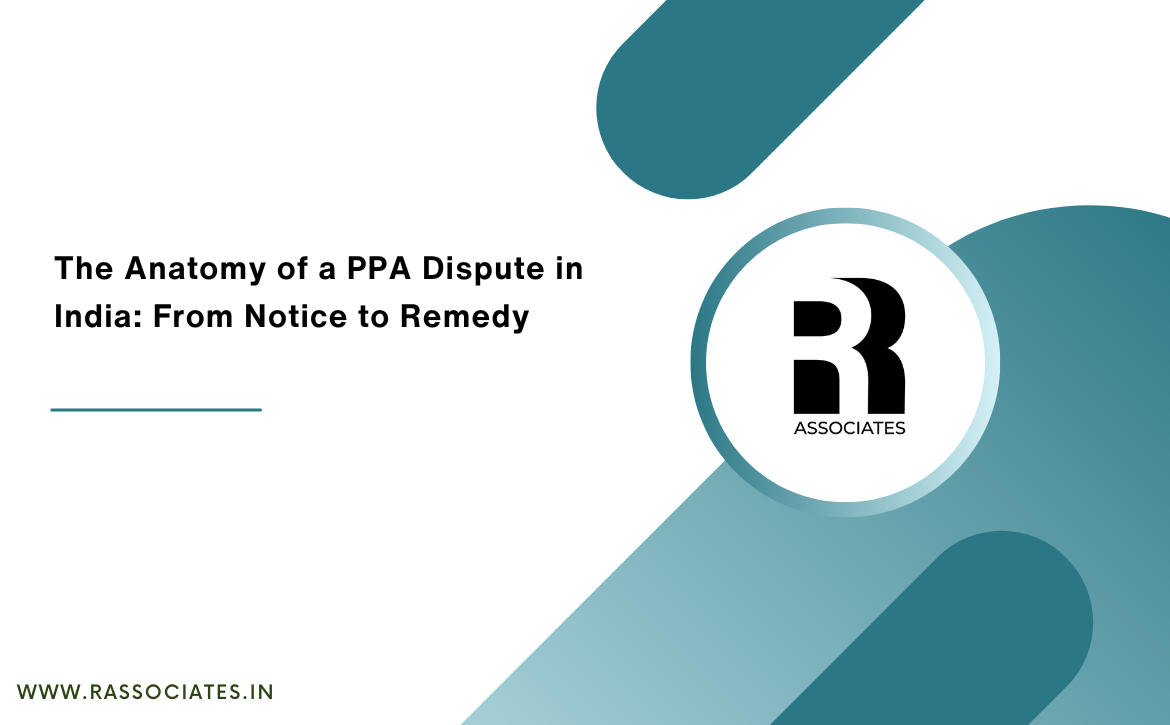
The Anatomy of a PPA Dispute in India: From Notice to Remedy
Understanding Power Purchase Agreement Disputes in India
The power sector in India has evolved quite a bit lately, and Power Purchase Agreements (PPAs) form the backbone of electricity generation and distribution. These contracts define how electricity generators, whether renewable or conventional, sell power to distribution companies (DISCOMs), ensuring commercial certainty and grid stability. However, as tariffs evolve, renewable targets expand, and regulatory frameworks tighten, power purchase agreement disputes in India have grown both in number and complexity.
A typical PPA dispute resolution in India can arise from multiple fault lines, including delays in project commissioning, disputes over tariff adjustments, curtailment of power by DISCOMs, or claims under the “Change in Law” clause. Each such disagreement can spiral into full-fledged regulatory litigation spanning multiple forums—from State Electricity Regulatory Commissions (SERCs) to the Appellate Tribunal for Electricity (APTEL), and sometimes even the Supreme Court.
This article breaks down the litigation lifecycle of a PPA dispute in India—from the moment a notice is issued, through the maze of jurisdictional forums, to the final remedies available to aggrieved parties.
What Triggers PPA Disputes in India?
Disputes under Power Purchase Agreements (PPAs) usually stem from mismatched expectations between generators and distribution licensees (DISCOMs), or from regulatory and operational challenges that disrupt project timelines and commercial viability.
Below are the most common triggers in PPA disputes in India:
1.Tariff Disputes
Tariff determination is one of the most litigated aspects of any electricity regulatory dispute in India.
Generators often lock in tariffs through competitive bidding or under cost-plus mechanisms approved by the State Electricity Regulatory Commission (SERC). Conflicts arise when:
- A DISCOM refuses to honour an agreed tariff, citing “unviable rates” or “change in circumstances.”
- The generator seeks tariff revision under the Change in Law clause due to new taxes, duties, or policy changes.
- Retrospective tariff reductions or renegotiations are attempted by state utilities, often seen in renewable energy PPAs (notably in Andhra Pradesh and Gujarat cases).
2.Commissioning Delays (COD) and Construction Hurdles
The Commercial Operation Date (COD) determines when the project is deemed ready to supply power. Delays in achieving COD, whether due to force majeure, delay in grid connectivity, or financing issues, often lead to disputes.
DISCOMs may impose Liquidated Damages (LDs) or encash Performance Bank Guarantees (PBGs), while developers may argue that delays were beyond their control, such as late evacuation approvals or right-of-way obstructions.
3.Curtailment of Power and Grid Backdowns
Curtailment refers to situations where DISCOMs refuse to schedule or offtake power even though it is available for supply.
While PPAs often guarantee “must-run” status for renewable plants, especially solar and wind, state load dispatch centres (SLDCs) sometimes curtail generation citing “grid security.”
Developers argue this amounts to a breach of PPA unless backed by valid technical grounds.
4.Change in Law and Policy Transitions
One of the most contentious areas in PPA dispute resolution in India involves the Change in Law clause. Introduction of new taxes (like GST), safeguard duties on solar modules, or changes in transmission regulations can significantly affect project economics.
Developers typically seek pass-through of these costs, while DISCOMs resist on procedural or interpretational grounds, leading to regulatory litigation.
Contractual Preconditions Before Litigation
Before a power purchase agreement dispute in India matures into a regulatory or arbitral proceeding, parties must navigate several contractual preconditions embedded in the PPA itself.
These clauses serve as both a compliance checklist and a procedural gatekeeper.
1.Conditions Precedent (CPs)
Most PPAs stipulate a list of Conditions Precedent (CPs) that the developer must fulfil before the agreement becomes fully operational. These may include:
- Achieving financial closure
- Securing land and statutory approvals
- Executing grid connectivity and transmission agreements
If CPs are not satisfied within the stipulated period, DISCOMs may terminate the PPA or encash the developer’s Performance Bank Guarantee (PBG). However, delays often stem from state authorities’ slow approvals—raising questions of equity and fairness.
2.Commercial Operation Date (COD)
The Commercial Operation Date marks the official commencement of power supply obligations.
Disputes arise when DISCOMs allege the project was not “ready for dispatch,” while developers argue that grid non-readiness delayed synchronization. Evidence such as grid inspection reports, testing certificates, and SLDC communication logs play a vital role in proving whether COD was legitimately achieved.
3.Liquidated Damages (LDs) and Performance Bank Guarantees (PBGs)
LDs are pre-agreed penalties for delay or non-performance, while PBGs act as financial security. DISCOMs often encash PBGs citing commissioning delays or breach of PPA.
Developers typically challenge such encashments as arbitrary or contrary to force majeure provisions. Regulatory bodies like CERC and SERCs have repeatedly held that LDs and PBGs cannot be enforced if delays stemmed from events beyond the developer’s control or if the utility itself contributed to the delay.
4.Notice and Cure Periods
Before initiating a formal claim or termination, PPAs generally require issuance of notice and allow a cure period for rectification. A failure to issue or properly serve notice can invalidate later proceedings.
These preconditions form the procedural foundation of every PPA dispute resolution in India. Observing them meticulously can prevent premature litigation and strengthen the developer’s case before the SERC or APTEL.
Forums & Hierarchy
The appropriate forum is critical in a power purchase agreement dispute in India, as jurisdiction determines both procedural timelines and the nature of available remedies. PPAs often contain arbitration clauses, but statutory disputes under electricity law can sometimes override contractual choices.
1.State Electricity Regulatory Commissions (SERCs)
SERCs are the first point of contact for most PPA disputes, particularly those involving:
- Tariff disagreements
- Claims for damages due to curtailment
- Enforcement of PPA obligations under the Electricity Act, 2003
SERCs have quasi-judicial powers to issue orders binding both generators and DISCOMs. Filing before a SERC is generally mandatory for disputes relating to regulated tariffs or grid operations, unless the PPA explicitly carves out arbitration for such claims.
2.Appellate Tribunal for Electricity (APTEL)
Aggrieved parties can appeal SERC orders to APTEL, which serves as the national-level appellate authority. Key characteristics include:
- National jurisdiction, addressing cross-state disputes
- Power to award damages, direct specific performance, or remand cases to SERCs
- Precedents set in APTEL PPA cases (e.g., Andhra Pradesh Solar PPA disputes) often guide future litigation
APTEL appeals are particularly common when SERC orders are perceived as inconsistent, delayed, or procedurally flawed.
3.Writ Jurisdiction
When parties believe statutory bodies have exceeded powers or violated fundamental rights, writ petitions under Article 226/32 of the Constitution may be filed in High Courts or the Supreme Court. These are exceptional remedies, usually pursued to secure:
- Stay of PPA termination
- Interim injunctions preventing encashment of PBGs
- Clarification on regulatory interpretation
4.Arbitration Carve-Outs
Some PPAs include arbitration clauses for commercial disputes. However, Indian courts have clarified that statutory obligations under the Electricity Act cannot be completely ousted by arbitration. Typically:
- Purely contractual claims (e.g., late payment penalties, indemnities) can go to arbitration
- Regulatory claims, tariff revision, or change-in-law disputes remain under SERC/APTEL jurisdiction
Evidence Strategy
In any power purchase agreement dispute in India, the strength of the case often hinges on meticulous evidence collection and presentation. Regulators and tribunals closely examine whether obligations were met, whether delays were excusable, and whether losses claimed are substantiated.
1.Grid Readiness and Evacuation Delays
One of the most frequent points of contention is whether the generator was ready to supply power and whether the DISCOM facilitated evacuation. Evidence includes:
- Grid synchronization certificates from the State Load Dispatch Center (SLDC)
- Communication logs for connectivity approvals
- Dispatch schedules showing actual versus scheduled generation
2.Metering and Energy Accounting Records
Accurate metering is critical to prove both delivery and shortfall of electricity. Documentation that regulators scrutinize includes:
- Meter calibration certificates
- Monthly energy accounting reports
- SLDC and DISCOM dispatch reconciliations
3.Force-Majeure Proof
Force majeure clauses protect generators from liability for events beyond their control. Commonly invoked scenarios are:
- Natural disasters (floods, cyclones)
- Grid failures beyond developer control
- Regulatory or policy delays
4.Documentary Trail of Notices and Communications
Every notice, email, or response related to contractual obligations, cure periods, or dispute escalation is crucial. A well-maintained documentary trail can:
- Prove that statutory and contractual preconditions were followed
- Demonstrate proactive mitigation efforts by the developer
- Strengthen claims before SERCs or APTEL
Conclusion
A power purchase agreement dispute in India is rarely a straightforward contract case—it sits at the intersection of regulatory oversight, commercial obligations, and public policy. Understanding the contractual framework, following procedural prerequisites, choosing the right forum, and building a sound evidentiary record are critical to securing relief.
For both developers and DISCOMs, proactive compliance and timely dispute management are the only sustainable strategies in India’s maturing power market.
Read More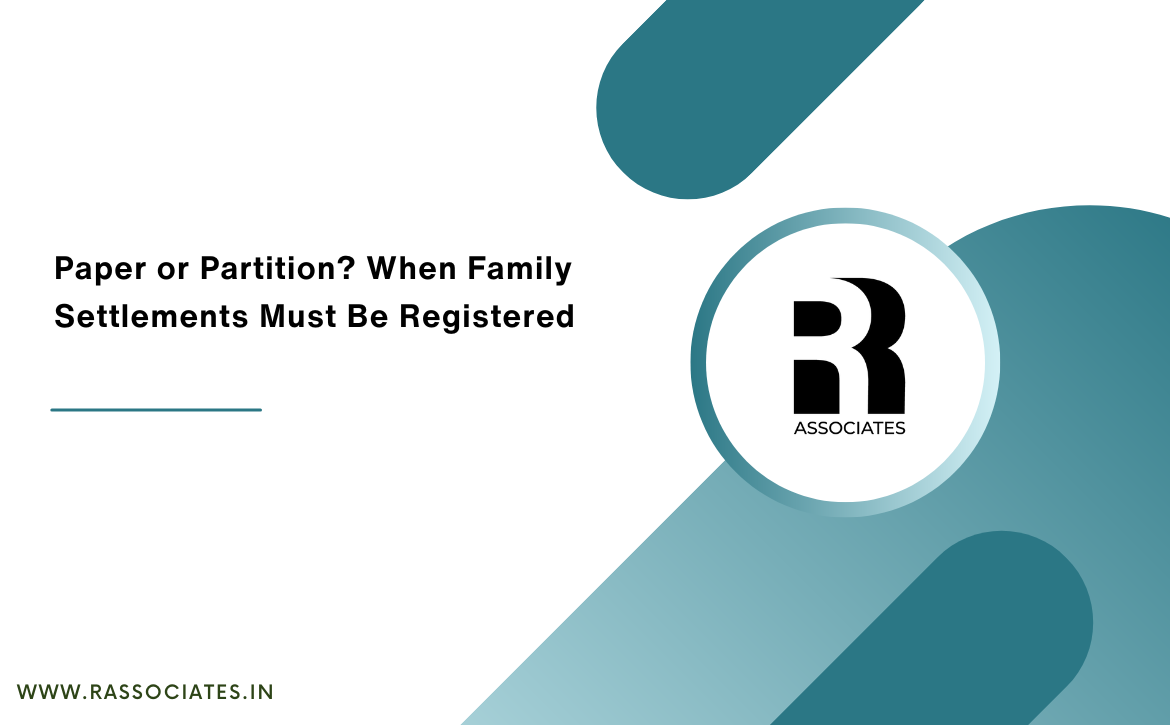
Paper or Partition? When Family Settlements Must Be Registered
Families divide property all the time. Sometimes it’s an oral bargain at the puja; sometimes it’s a written note signed by elders and called a memorandum of family arrangement. Other times the parties execute a formal partition deed and move to register it at the Sub-Registrar. Which of those papers must be registered?
This question matters in Delhi, not only for legal validity, but because registration and stamp duty (and the risk of a document being held inadmissible) have real financial and practical consequences for co-owners and heirs. Documents that themselves create, assign, limit or extinguish rights in immovable property are compulsorily registrable under Section 17 of the Registration Act.
Memorandum of Family Arrangement vs. Partition Deed
The legal distinction rests on whether the document itself changes ownership rights or merely records an arrangement already concluded. Courts — including the Delhi High Court and the Supreme Court — have consistently applied this test.
- Memorandum of Family Arrangement (MOFA):
A memorandum only records that a family settlement has taken place. If the arrangement was oral, acted upon, and accepted by all members, a written memorandum is treated as a record of a past transaction. Such a memorandum does not require compulsory registration under Section 17 of the Registration Act. It serves as evidence of the family settlement but does not, by itself, transfer property. Delhi courts have upheld this principle, provided the writing is not couched in terms that itself “allots” or “conveys” ownership. - Partition Deed:
A partition deed, on the other hand, is an instrument of title. If co-owners divide immovable property through a written deed, that deed creates and defines rights in the property. Under Section 17(1)(b) of the Registration Act, 1908, and Section 35 of the Delhi Stamp Act, such a deed must be registered. An unregistered partition deed is inadmissible as evidence and cannot be relied upon to prove title in a Delhi court.
In practical terms:
- If the family had already divided property orally and possession reflects that, a later memorandum of family arrangement is enough and need not be registered.
- If the parties are using a written deed to effect division for the first time, it is a partition deed registration case and registration is mandatory.
This “operative effect vs. record” test has been applied in landmark judgments such as Kale & Ors. v. Deputy Director of Consolidation (1976) [1] and followed by Delhi High Court in subsequent property disputes.
Registration Requirements in Delhi
In Delhi, the distinction between family settlement registration and partition deed registration becomes more than theory because it ties directly into stamp duty, registration costs, and enforceability in court.
Partition Deed Registration in Delhi
- Stamp Duty: A partition deed attracts stamp duty based on the market value of the separated share. Under the Delhi Stamp Act, duty is typically calculated at 2% of the separated share when property is partitioned among family members, though exemptions exist in transfers between certain classes of heirs (like parents and children, or among siblings).
- Registration Process: The deed must be presented at the Sub-Registrar’s office in whose jurisdiction the property falls. All co-owners should be present with original ID, photographs, and proof of ownership.
- Consequences of Non-Registration: An unregistered partition deed cannot be admitted as evidence of title or property rights in court. At best, it may be looked at for collateral purposes (such as showing possession), but not for establishing ownership.
Family Settlement Registration in Delhi
- When It’s Not Required: A simple memorandum of family arrangement that only records an already completed oral settlement does not require registration or stamp duty. It is admissible in Delhi courts as evidence of a past arrangement.
- When It Becomes Mandatory: If the memorandum itself “allots” property or operates as a conveyance, registration is compulsory. Courts will look at the wording — phrases like “hereby gives” or “hereby transfers” often convert what looks like a memorandum into a partition deed in disguise.
- Stamp Duty Position: If registration becomes necessary, the document will be treated like a partition deed and charged duty accordingly.
FAQs
1. Is family settlement registration in Delhi always mandatory?
No. If the settlement was oral and later recorded in a memorandum, registration is not mandatory. Registration is required only when the document itself divides or transfers ownership in immovable property.
2. What is the difference between a memorandum of family arrangement and a partition deed?
A memorandum of family arrangement records an already concluded oral division, while a partition deed is the instrument that actually effects the division. The former may not need registration; the latter always does.
3. What happens if a partition deed is not registered in Delhi?
An unregistered partition deed is inadmissible as evidence of ownership in court. At best, it can be used for collateral purposes like showing possession, but it cannot establish title.
4. What stamp duty is payable on partition deed registration in Delhi?
Stamp duty is typically 2% of the separated share’s market value when partition is among family members. However, concessions and exemptions may apply in certain cases of partition among immediate heirs.
5. Can banks or buyers accept a memorandum of family arrangement as proof of title?
Generally, financial institutions and purchasers prefer registered partition deeds because they create a clear chain of title. A memorandum may be valid in law but often faces practical hurdles in transactions.
6. Should I consult a lawyer before executing a family settlement?
Yes. Because Delhi courts look at the substance of the document and not just its title, professional drafting ensures the arrangement will hold up legally and prevent future disputes.
Conclusion
In Delhi’s property landscape, the difference between a memorandum of family arrangement and a partition deed is not just academic. It decides whether your document is enforceable or a dead letter in court.
Families often believe that a signed paper, even if unregistered, is enough to avoid future disputes. In reality, unless the document is correctly categorized and, where necessary, registered with the Sub-Registrar, the settlement risks collapsing at the first sign of conflict.
[1] 1976 SCC (3) 119
Read More
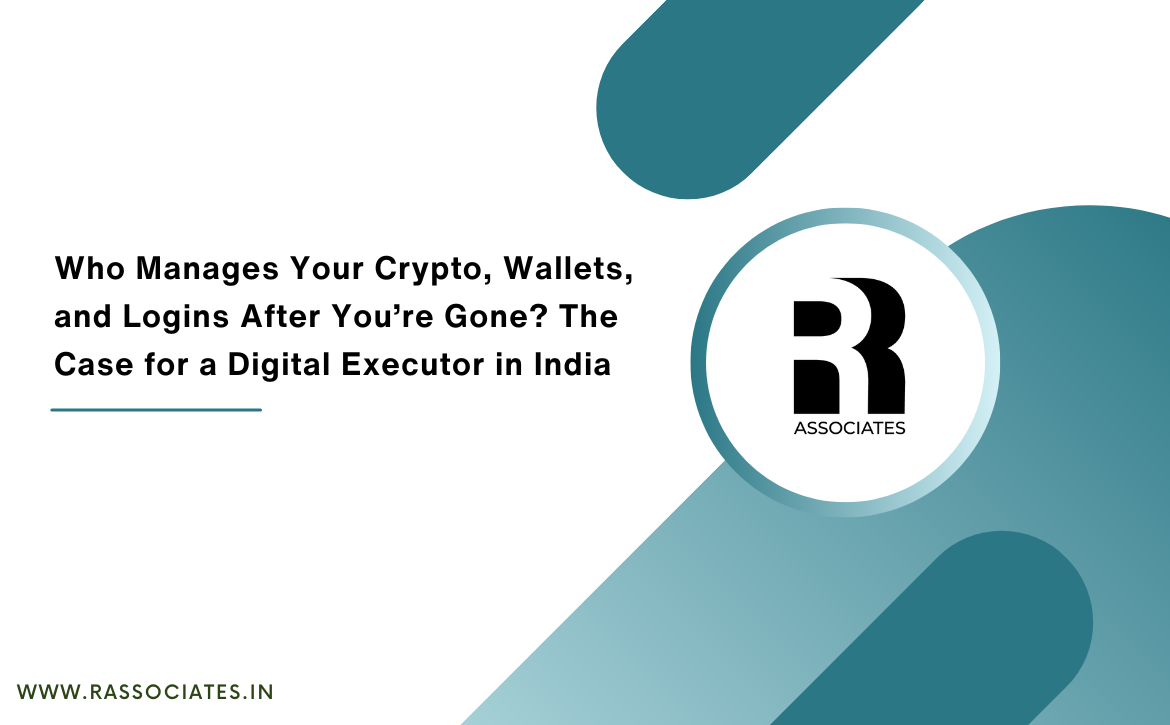
Who Manages Your Crypto, Wallets, and Logins After You’re Gone? The Case for a Digital Executor in India
Succession planning in India has long revolved around physical property, bank accounts, and investments. But today, a large part of family wealth sits in less visible places—crypto wallets, UPI balances, brokerage/demat accounts, subscription vaults, and even revenue-generating YouTube or Instagram handles. These are “digital assets,” and without planning, they often vanish into limbo when the primary holder dies.
A growing solution is to appoint a “digital executor” clause in a Will or Trust. This is the person legally authorised to access, manage, and transfer your digital assets after your death—without violating India’s privacy laws, cybercrime statutes, or custodian contracts like Google, Paytm, or Binance.
For families, this clause could mean the difference between heirs inheriting real value versus fighting a wall of locked accounts and expired passwords.
What Counts as a Digital Asset in Succession Planning
In India, digital assets are not yet defined under a single statute, but in practice, they fall into clear categories that families increasingly need to account for:
- Crypto holdings – Bitcoin, Ethereum, and other tokens stored in private wallets or exchanges. Without seed phrases or KYC-linked exchange accounts, these can be impossible to trace or transfer.
- UPI and mobile wallets – Paytm, PhonePe, Google Pay balances, which can hold significant funds but are governed by RBI and wallet-provider rules.
- Demat and brokerage logins – Securities are already governed by SEBI and depositories like NSDL/CDSL, but heirs cannot operate accounts without proper succession paperwork.
- Cloud and subscription vaults – Google Drive, iCloud, Dropbox, and SaaS accounts containing valuable intellectual property, family archives, or even professional data.
- Creator and digital revenue accounts – YouTube channels, Instagram handles, or Substack newsletters that can continue to generate monetisable value.
Each of these raises different legal and contractual hurdles. For example, crypto inheritance in India is complicated because there is no regulatory clarity on transfer after death, and private keys are outside the formal banking system.
By contrast, a demat login after death has established pathways—probate, succession certificates, or transmission requests. A digital executor clause is meant to bridge these varied realities by naming a custodian with lawful authority to deal with every digital asset category.
Appointing a Digital Executor in a Will or Trust
The law in India does not yet recognise a “digital executor” as a separate office, but nothing prevents you from explicitly empowering one through your Will or Trust. Under the Indian Succession Act, you can appoint executors with defined powers. Adding a clause that authorises a chosen person to manage digital assets ensures heirs have a clear legal representative to deal with custodians, regulators, and service providers.
A digital executor clause should do three things:
- Identify the digital assets – list categories, such as crypto holdings, UPI wallets, demat accounts, social media logins, and cloud storage. You need not disclose passwords in the Will itself (to protect privacy), but you can reference a confidential inventory maintained separately.
- Grant specific authority – state that the digital executor can access, transfer, close, or archive online accounts in compliance with applicable law. This avoids disputes where heirs have to guess whether such access would breach contracts.
- Provide succession mechanics – clarify whether the digital executor works alongside the main executor of the estate, or has exclusive control over digital assets. This separation prevents confusion when heirs try to approach banks, brokerages, or wallet providers.
For families holding crypto or running creator platforms, this clause can mean the difference between lawful inheritance and assets permanently locked away. In fact, estate planning for digital assets in India now often involves creating a Will for online accounts, where instructions for logins, data, and digital revenue streams sit alongside traditional property bequests.
Custodian Contracts, Privacy Norms, and Legal Limits
Even with a digital executor clause, heirs cannot simply demand access. Most digital service providers—whether Binance, Paytm, or Google—operate under strict Terms of Service (ToS) that typically prohibit password sharing or unauthorised access.
That is why formal succession documents matter. For example:
- Crypto exchanges may require a probate or succession certificate naming the heir or executor, along with death certificates and KYC records, before releasing holdings.
- UPI wallet after-death balances are governed by the RBI’s Prepaid Payment Instruments (PPI) regulations; heirs must provide succession documents to transfer funds to a linked bank account.
- Demat login after death is handled through SEBI’s transmission process, which requires submission of a death certificate and succession documents to the depository participant.
- Cloud or subscription accounts often fall back on the provider’s legacy policy (Google’s “Inactive Account Manager” or Apple’s “Digital Legacy” framework). If no nomination exists, heirs must approach the company with probate documents.
A properly drafted Will that appoints a digital executor ensures heirs are not left violating terms by brute-force logins or password sharing. This balance respects both the deceased’s privacy and India’s emerging norms on digital assets succession in India.
Conclusion
Digital wealth is no longer fringe—it sits at the heart of modern family estates. From crypto inheritance in India to UPI wallets after death and demat logins, the reality is that most financial and personal value today flows through digital platforms.
Without a plan, these assets risk being locked away indefinitely, either lost in forgotten servers or blocked by service providers enforcing privacy rules.
A digital executor clause provides heirs with lawful authority to claim what belongs to them, while respecting custodian contracts and India’s cyber laws. Families that adapt early will ensure smooth transitions across both the physical and digital legacies they leave behind.
Read More